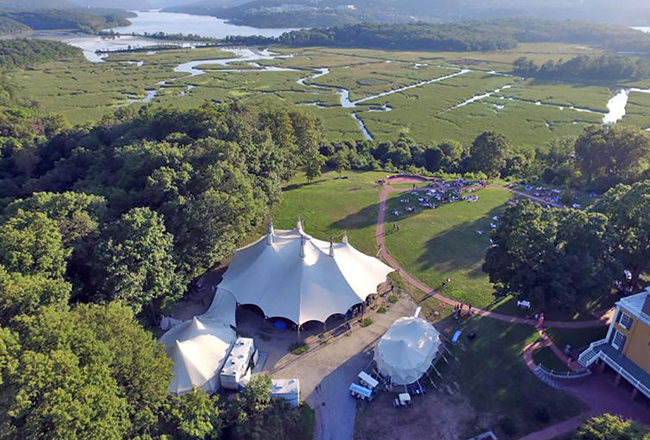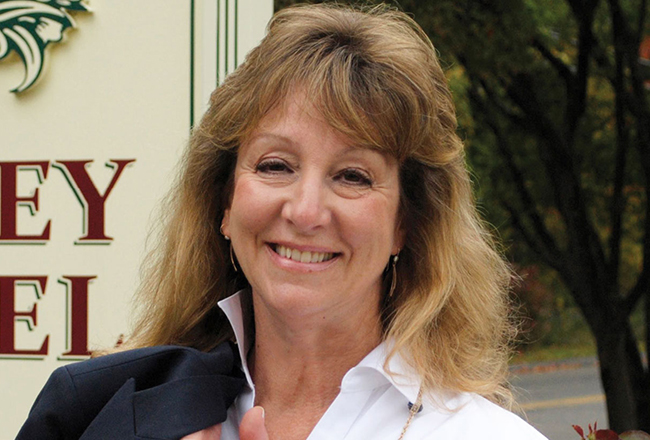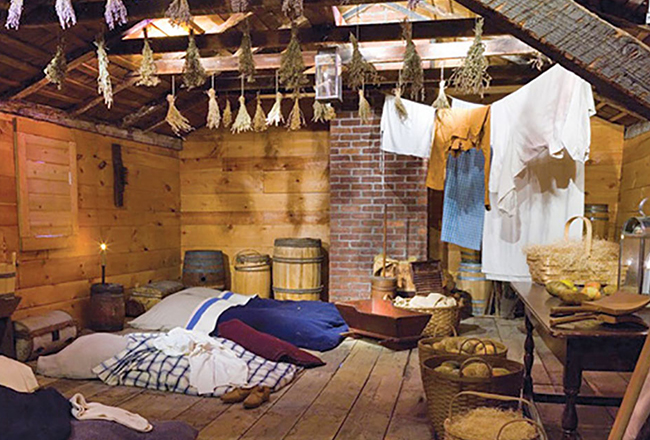In what has likely been the toughest year the modern theater industry has ever faced, the Hudson Valley Shakespeare Festival (HVSF) has found itself uniquely positioned for the future.
Even with so many theater companies in survival mode, the festival can plan for its long-term future, thanks to the acquisition of a new permanent performance space in Garrison, donated by a local philanthropist.

Like other theaters, the nonprofit was not without its own struggles over the past year. It operates seasonally and last summer had to shut down in-person performances completely.
“In a typical season, we have somewhere around 85 performances and our theater has 540 seats,” said Katie Liberman, managing director for the festival. “In a season, we estimate that we reach about 35,000 people in the theater and then we”™ve also historically, in the last five years, sent some plays on tours to different venues throughout the Hudson Valley.
“That helps us reach a wider audience,” she continued, “which gets us closer to around 40,000 people.”
That number was down significantly in 2020, with only online opportunities for programming, including a reading series and a community playwriting competition. Liberman reported a great turnout for the online events, but nowhere near the usual numbers for in-person performances.
The festival”™s closing had a huge impact on its seasonal employees, of which there are usually over 200, with eight to 10 more employed year-round. It”™s one of the largest employers in the area and has an estimated economic impact of $7 million annually.
“It”™s a huge number of people who come together to make this happen every summer,” Liberman said. “Last year we were, I”™m grateful to say, thanks to the PPP loan able to maintain almost all of our year-round staff ”” not entirely ”” and we were able to offer some small payments to a lot of that seasonal staff. But usually in late July we have a payroll of about 200 people, and last year it was probably eight.”
The nonprofit makes roughly half of its revenue through performances, with the rest coming from donations and some grants.
Luckily for the festival, its open-air tent layout is extra advantageous for guests who otherwise may be hesitant to return to indoor spaces. At the moment, capacity will still have to be limited to roughly 180 guests, but could expand more as Covid-19 cases decrease in the area and more restrictions are lifted.
The company will only host two in-person productions this year, down from its usual three or four;a third will be online only. Its staff, although able to include many more employees than last year, will continue to be reduced.
New space
This summer is not only a return for the Shakespeare Festival, but also a farewell, as it is the last season on the grounds of its leased home at Boscobel House and Gardens, where it has been a tenant for 34 years.
Starting in 2022, the festival will move to its new home at the current grounds of the Garrison Golf Club, only about four miles from Boscobel. The land was donated by its owner, philanthropist Christopher Davis.
“It”™s going to be this amazing experience of culture and nature coming together, and I don”™t think there”™s another thing like it in the whole of American theater,” said Davis McCallum, the festival”™s artistic director. “So despite how hard the last 16 months have been for the theater overall, we couldn”™t be more enthusiastic about what”™s ahead for HVSF.”
Of the 200 acres Davis has donated, 97 are for the Shakespeare Festival. A 74-acre parcel will be for environmental conservation, supervised by the Hudson Highlands Land Trust, while the remaining 30 acres will be set aside for a residence for the Davis family.
“It”™s such a visionary gift, because commercial golf courses are failing all over the country and most of the time, they get sold to real estate developers who turn them into housing subdivisions,” McCallum said. “But Chris Davis has decided to go a different path and preserve the open space, permanently protect it from development and offer part of it to a local arts organization to turn this landscape into a real public asset ”” a community asset.
“I think part of what motivated him was a real interest in land conservation and sustainability,” he added. “So as we move into this next chapter of our life as a theater company, we”™re prioritizing environmental sustainability. Our ambition is to be one of the greenest theaters in the country.”
Five of the acres allotted to the organization will house the facilities, pathways and parking lots, while the rest will be for conservation and cultivation of meadows, wildflower gardens, walking paths, managed forests and open lawn space.
The festival team members knew they wanted to embrace their roots and keep the most-loved aspects of the performances and venue at Boscobel. The space will stay familiar to HVSF”™s fans; the tent will remain, although it will be a new, permanent structure, staying open to the outdoors and keeping its intimate size, which will actually decrease from 540 to about 510.
“A lot of the things that audiences love, we”™re going to preserve,” McCallum said, “like the ability to picnic before the show, the way the actors appear over the ridge and the spectacular view of the Hudson River.
“But there are other things that we”™ve never been able to offer that we will be able to in our new home,” he continued. “For example, our lease at Boscobel prevents us from offering matinee performances, which we”™ll be able to do. And we”™ll be able to run the place into the beautiful Hudson Valley fall, into September or October, which will enable all sorts of new partnerships with our education partners, like school matinees and school visits.”
Thinking long-term
Though the festival will move to the new location for its 2022 season, it will bring along the old tent from Boscobel until the permanent space is constructed, affording the organization time to thoroughly map out a plan for the new space, and to look toward realizing its long-term aspirations.
“In particular what”™s been really interesting for us is that when we first reached out to the planning board about this project, we asked them how we should make a presentation, and they recommended that we should look at the long-term future for the Shakespeare Festival,” Liberman said. “What could this site look like in 30 years? And how does that embody our aspirations for the company and how we could use the site?
“That”™s been a really exciting opportunity for us, as an organization,” she said, “to spend time envisioning what that could be.”
A smaller indoor theater, to operate year-round, is also being proposed, along with a welcome center, a community pavilion, another smaller indoor theater for year-round use, a rehearsal barn and cabins to provide on-site lodging for seasonal artists.
The chance to step back and plan has clarified what makes the Shakespeare Festival unique, and how necessary its partnerships and relationships within the community are.
“The theaters that are not just going to survive but thrive for years to come are the ones that are going to be in a unique and vital relationship with the communities that they”™re called to serve, and that”™s certainly our aspiration for HVSF,” McCallum said. “Our theater is a big tent, literally, but that”™s also the metaphor ”” that there”™s an abundant sense of welcome and that everyone can find themselves in the conversation with the work that we”™re presenting. That”™s our hope.”
The staff recognizes the importance of being in conversation, whether that be with the space they”™re in, the community they serve or in matters of national importance.
“We”™ve started doing more and more work where we”™re not just asking our community to come and watch the play, but we”™re saying, ”˜Come join us in making something together,”™” McCallum said. “There”™s something about a theater where you”™re asked to sit in the dark and look at the actors on a raised stage, doing something amazing.
“That”™s a model, and that can also be exciting,” he continued, “but that”™s not the kind of exchange that happens under the tent, where you can see everybody else, the actors can see you and there”™s this real two-way flow of energy ”¦ we”™re trying to let that same feedback loop inform our whole organization.”
This year”™s productions include “The Most Spectacularly Lamentable Trial of Miz Martha Washington” by James Ijames, a living American playwright, and Shakespeare”™s “The Tempest.”
“We feel that these are two plays that are about family and justice and accountability and freedom, all of which are ideas that have been circulating in conversations particularly around race and racial justice in America,” McCallum said. “(”˜Washington”™), I think, is really connected to ”˜The Tempest,”™ which also has these relationships of power and accountability and justice and a strong thematic undercurrent of bondage and freedom.
“A lot of people also feel like there”™s something in the play that feels like a farewell,” he added. “Some people even think it”™s Shakespeare”™s final play. So we think it”™s a good kind of swan song and a way of honoring more than 30 years of history at Boscobel.”






















